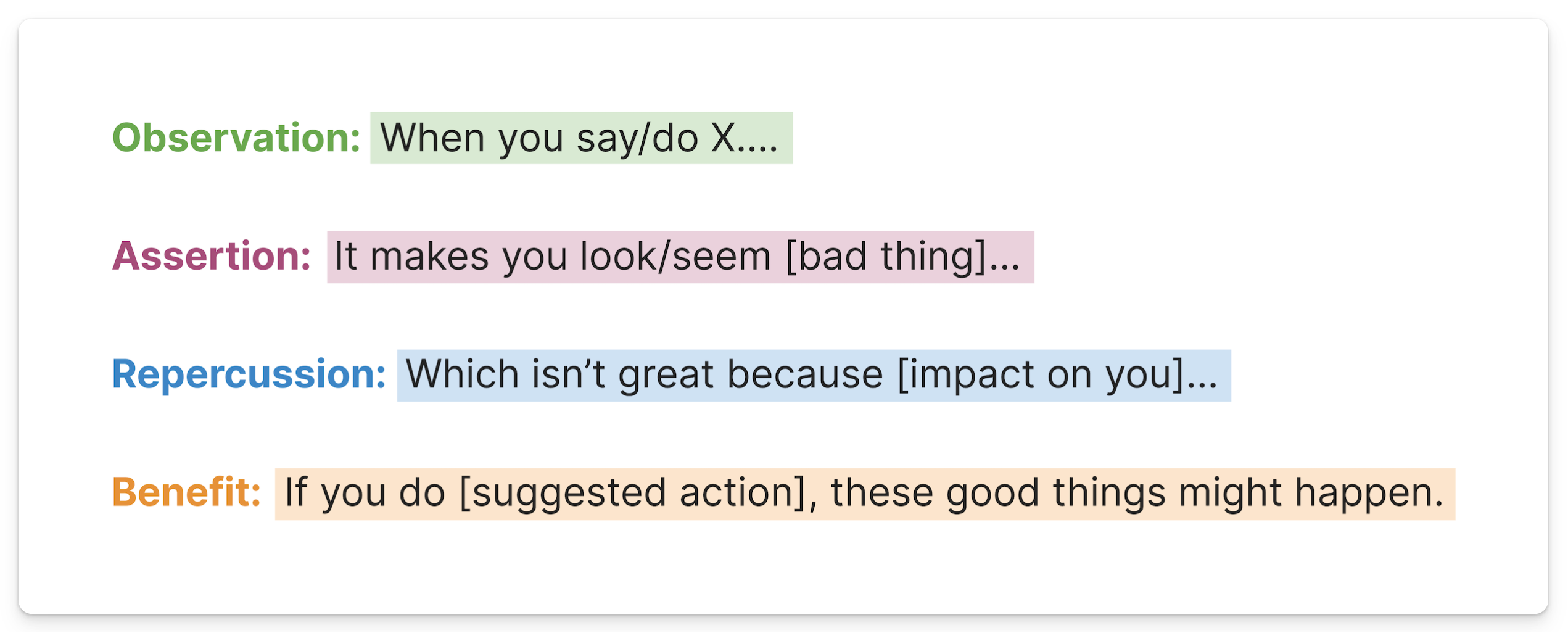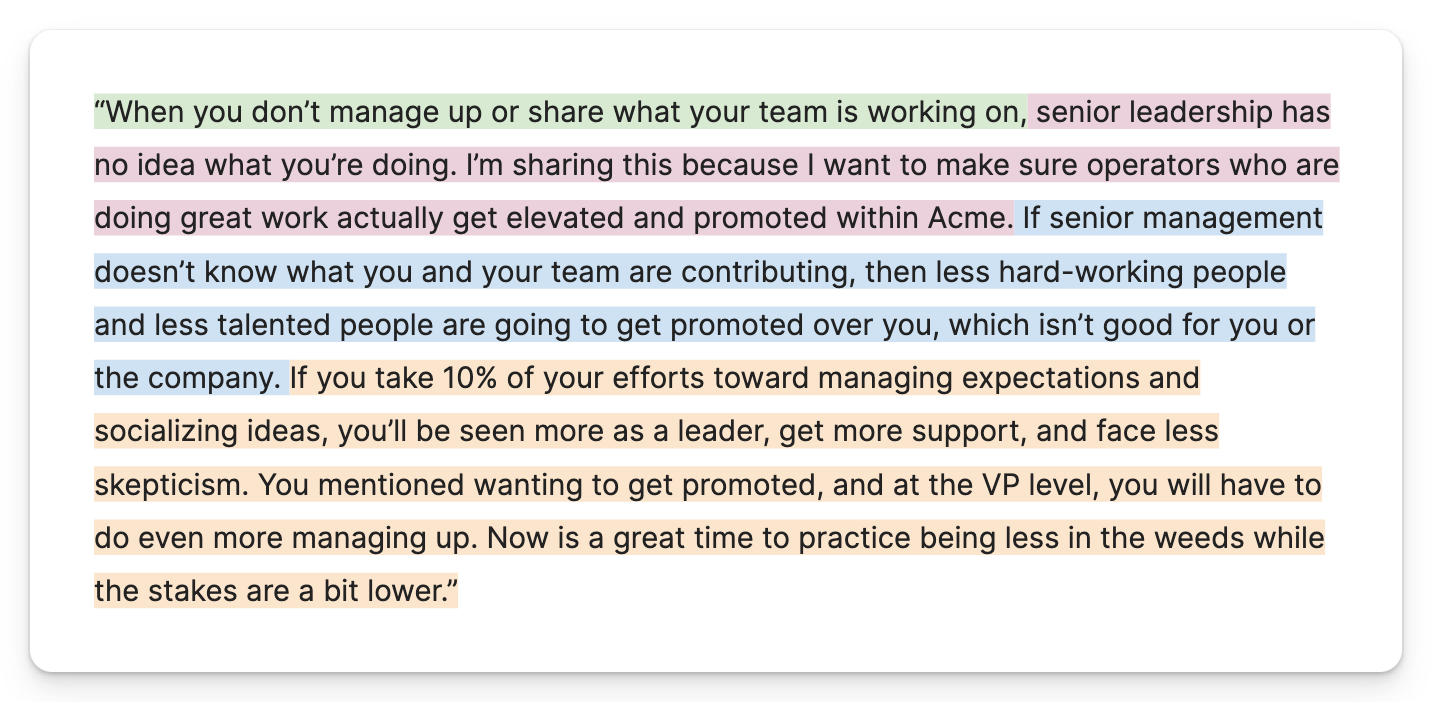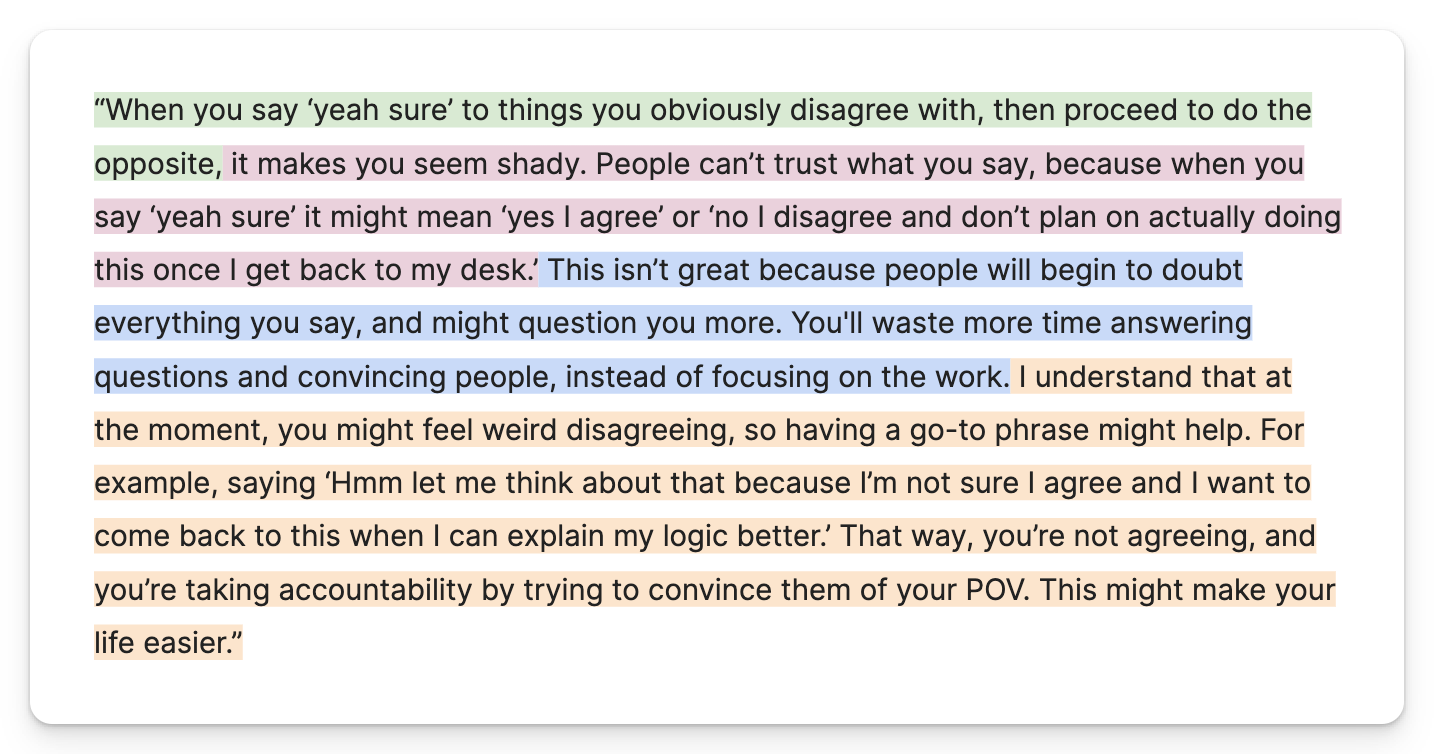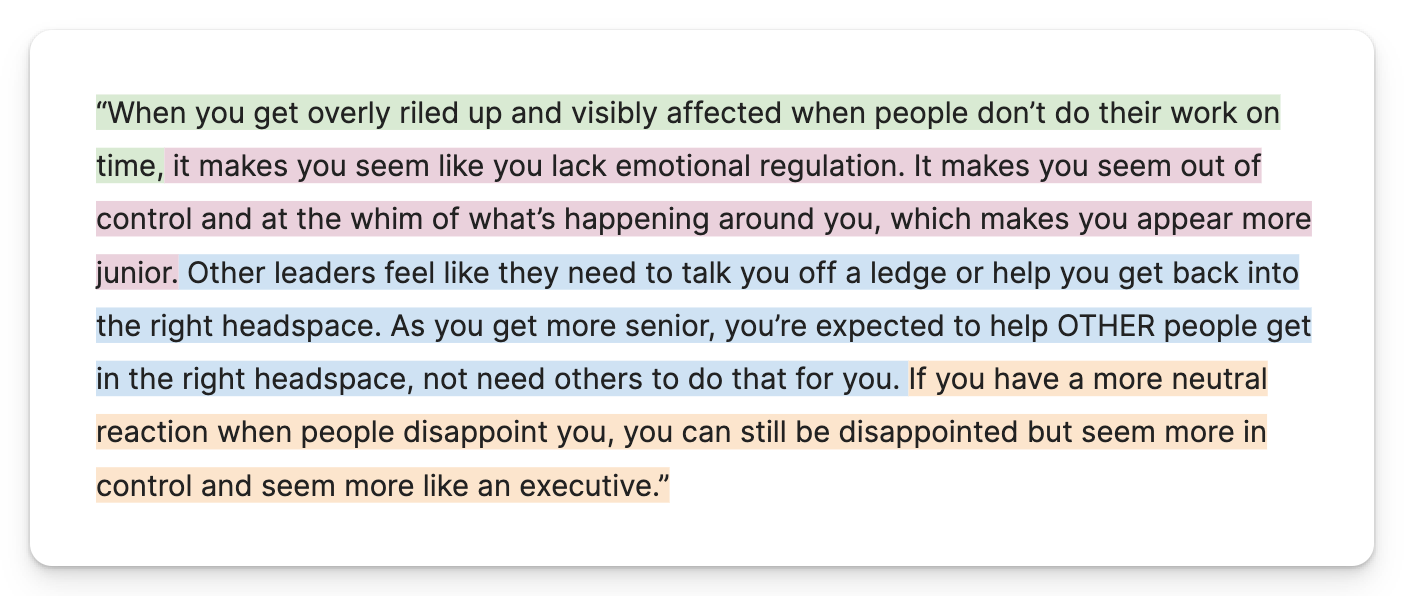The OARB framework: Why appealing to self-interest is better for everyone
The OARB framework: Why appealing to self-interest is better for everyoneYou must give your recipient a reason to take your feedback. Go straight for what will hit them in the gut: appeal to why they'll personally benefit.👋 Hey, it’s Wes. Welcome to my weekly newsletter on managing up, driving growth, and standing out as a high-performing leader. ⛑️ Work with me 1:1 for executive coaching. I pour my strategic thinking into helping my clients as a sparring partner. If you’re interested in how I can support you, hit reply or fill out this form. In this week’s newsletter, I’ll share an advanced technique for getting your feedback recipient to perk up and take action.
Read time: 8 minutes It’s hard to persuade people to change. Which is why I’m shocked at how many leaders choose to play on “hard mode” by ignoring truths about human nature when trying to drive behavior change in team members. Three truths about human nature:
If you want to drive behavior change, I believe you must take these truths into account. Appealing to a person’s better nature—for example, by sharing the impact of a higher-order benefit like how their actions impact the team—might be enough to change someone’s behavior 70% of the time. But for tougher situations where the person isn’t easily persuaded, you may want to bust out a tactic that’s more industrial-strength. Enter: appealing to self-interest. Part I: The OARB framework (observation, assertion, repercussion, benefit)Appealing to self-interest is better for everyone. They’ll stop doing what’s ineffective and start doing what works. You’ll spend less time convincing them to take your feedback seriously. I created the OARB framework (Observation, Assertion, Repercussion, Benefit) to maximize the chances your recipient will understand what to change, why, and how they will benefit.
I teach this to my executive coaching clients to help them feel more confident giving hard-to-hear, necessary feedback. Here are a few examples of the OARB framework in action (with color-coding): Example 1: A VP giving feedback to their director-level report
Why this works:
Example 2: An executive sharing feedback with a peer
Why this works:
Example 3: A CEO telling their exec to avoid being overly upset by disappointment/frustration
Why this works:
Part II: Make it feel visceral by using good logicLet’s say you’re giving feedback on why your team member should manage up more.
Sure, aiming for team success is great… Cue polite golf applause. But shooting myself in the foot? Creating more work for myself? Making my own life harder? These hit at a visceral level. These are concrete, visual, and appeal to self-interest. When in doubt, avoid appealing to higher-order abstract benefits like “crucial for our team’s success.” Appeal to what’s raw and visceral. Aim to make your recipient FEEL something. One thing to note: Emotion and logic are not opposites. Rallying someone to take action is not about using stereotypically inspiring rhetoric. You’re not Mel Gibson in Braveheart. You’re not Viggo Mortensen rallying an army to fight Sauron. In the workplace, what you’re saying has to actually make sense. It has to track. People mistakenly think the way to get someone to feel is by appealing wholly to emotion. But you can actually get someone to feel something by having sound logic that appeals to their identity and worldview. Good logic leads to your recipient feeling the reaction you want them to feel. When your logic makes sense from their perspective, they will change. Part III: Adopt a neutral postureFor all this to work, your recipient must realize it’s THEIR CHOICE to change. You’ve done your part by presenting your observation, assertion, repercussions, and benefits to them using the 4-part framework. But it’s ultimately their choice. I like to say:
People don’t want to be strong-armed. They don’t want to be forced to change. You don’t want to persuade them from a posture of desperation. You want to present facts and observations, and in doing so, help them see the cost of continuing down the path they're on. Comment on the behavior, not the personI once worked with a CEO who had a habit of telling people, “I know you better than you know yourself.” It drove their direct reports nuts. The CEO sometimes had good insights, but people were too busy feeling unfairly labeled to listen. His approach was counterproductive. If you try to tell people how they are, their natural reaction will be to push back. In general, avoid making claims that sound overreaching because you will inadvertently invite people to debate you. They’ll think, “You don’t know me. GTFO.” Instead, comment on how a specific behavior makes them come across a certain way.
This language is intentional because I don’t want to trigger people to argue with me. I’m commenting on my perception or other people’s perception of them. This is harder to argue with than me proposing that I know who they are deep down. I don’t know who they are deep down at their core—I only know how they show up at work and how they come across based on how they behave and what they say. So I’m sticking to facts and data points that are more objective. If you use the OARB framework, your recipient is much more likely to really hear you—and act on your suggestion. What did you find most helpful? Feel free to hit reply. Thanks for being here, and I’ll see you next Wednesday at 8am ET. Wes PS If you found this valuable, here are more ways I can help:
|
Older messages
Turning a yellow spot into the sun
Wednesday, June 19, 2024
This is the #1 trait I look for when hiring. Here's why you should aim to be someone who turns a little into a lot & why you should bring skill, judgment, and magic to raise the bar. ͏ ͏ ͏ ͏ ͏
Good design can obscure poor logic
Thursday, June 13, 2024
Well-designed docs are beautiful, but this presents a problem: You must actively ignore how good the document looks to avoid being fooled. Stay skeptical. ͏ ͏ ͏ ͏ ͏ ͏ ͏ ͏ ͏ ͏ ͏ ͏ ͏ ͏ ͏ ͏ ͏ ͏ ͏ ͏ ͏ ͏ ͏
How I give the right amount of context (in any situation)
Wednesday, June 5, 2024
Most people suck at managing up. They waste their manager's time with too much (or too little) information. Here's how to give the right amount of context. ͏ ͏ ͏ ͏ ͏ ͏ ͏ ͏ ͏ ͏ ͏ ͏ ͏ ͏ ͏ ͏ ͏ ͏ ͏
No more awkward performance reviews: How to be honest without making your direct report rage quit
Monday, June 3, 2024
Your direct report thinks they are exceeding expectations. You think they're underperforming. Here's how to navigate the disconnect. ͏ ͏ ͏ ͏ ͏ ͏ ͏ ͏ ͏ ͏ ͏ ͏ ͏ ͏ ͏ ͏ ͏ ͏ ͏ ͏ ͏ ͏ ͏ ͏ ͏ ͏ ͏ ͏ ͏ ͏
Emotional signposting: Why you should tell people how to feel
Wednesday, May 22, 2024
“Wait, is this good news or bad news?” When you don't give enough context, your audience can't always tell. To reduce cognitive load, remember to account for the emotional subtext. ͏ ͏ ͏ ͏ ͏ ͏
You Might Also Like
🚀 Ready to scale? Apply now for the TinySeed SaaS Accelerator
Friday, February 14, 2025
What could $120K+ in funding do for your business?
📂 How to find a technical cofounder
Friday, February 14, 2025
If you're a marketer looking to become a founder, this newsletter is for you. Starting a startup alone is hard. Very hard. Even as someone who learned to code, I still believe that the
AI Impact Curves
Friday, February 14, 2025
Tomasz Tunguz Venture Capitalist If you were forwarded this newsletter, and you'd like to receive it in the future, subscribe here. AI Impact Curves What is the impact of AI across different
15 Silicon Valley Startups Raised $302 Million - Week of February 10, 2025
Friday, February 14, 2025
💕 AI's Power Couple 💰 How Stablecoins Could Drive the Dollar 🚚 USPS Halts China Inbound Packages for 12 Hours 💲 No One Knows How to Price AI Tools 💰 Blackrock & G42 on Financing AI
The Rewrite and Hybrid Favoritism 🤫
Friday, February 14, 2025
Dogs, Yay. Humans, Nay͏ ͏ ͏ ͏ ͏ ͏ ͏ ͏ ͏ ͏ ͏ ͏ ͏ ͏ ͏ ͏ ͏ ͏ ͏ ͏ ͏ ͏ ͏ ͏ ͏ ͏ ͏ ͏ ͏ ͏ ͏ ͏ ͏ ͏ ͏ ͏ ͏ ͏ ͏ ͏ ͏ ͏ ͏ ͏ ͏ ͏ ͏ ͏ ͏ ͏ ͏ ͏ ͏ ͏ ͏ ͏ ͏ ͏ ͏ ͏
🦄 AI product creation marketplace
Friday, February 14, 2025
Arcade is an AI-powered platform and marketplace that lets you design and create custom products, like jewelry.
Crazy week
Friday, February 14, 2025
Crazy week. ͏ ͏ ͏ ͏ ͏ ͏ ͏ ͏ ͏ ͏ ͏ ͏ ͏ ͏ ͏ ͏ ͏ ͏ ͏ ͏ ͏ ͏ ͏ ͏ ͏ ͏ ͏ ͏ ͏ ͏ ͏ ͏ ͏ ͏ ͏ ͏ ͏ ͏ ͏ ͏ ͏ ͏ ͏ ͏ ͏ ͏ ͏ ͏ ͏ ͏ ͏ ͏ ͏ ͏ ͏ ͏ ͏ ͏ ͏ ͏ ͏ ͏ ͏ ͏ ͏ ͏ ͏ ͏ ͏ ͏ ͏ ͏ ͏ ͏ ͏ ͏ ͏ ͏ ͏ ͏ ͏ ͏ ͏ ͏ ͏ ͏ ͏ ͏ ͏ ͏ ͏ ͏ ͏ ͏ ͏
join me: 6 trends shaping the AI landscape in 2025
Friday, February 14, 2025
this is tomorrow Hi there, Isabelle here, Senior Editor & Analyst at CB Insights. Tomorrow, I'll be breaking down the biggest shifts in AI – from the M&A surge to the deals fueling the
Six Startups to Watch
Friday, February 14, 2025
AI wrappers, DNA sequencing, fintech super-apps, and more. ͏ ͏ ͏ ͏ ͏ ͏ ͏ ͏ ͏ ͏ ͏ ͏ ͏ ͏ ͏ ͏ ͏ ͏ ͏ ͏ ͏ ͏ ͏ ͏ ͏ ͏ ͏ ͏ ͏ ͏ ͏ ͏ ͏ ͏ ͏ ͏ ͏ ͏ ͏ ͏ ͏ ͏ ͏ ͏ ͏ ͏ ͏ ͏ ͏ ͏ ͏ ͏ ͏ ͏ ͏ ͏ ͏ ͏ ͏ ͏ ͏ ͏ ͏ ͏ ͏ ͏ ͏ ͏ ͏ ͏ ͏
How Will AI-Native Games Work? Well, Now We Know.
Friday, February 14, 2025
A Deep Dive Into Simcluster ͏ ͏ ͏ ͏ ͏ ͏ ͏ ͏ ͏ ͏ ͏ ͏ ͏ ͏ ͏ ͏ ͏ ͏ ͏ ͏ ͏ ͏ ͏ ͏ ͏ ͏ ͏ ͏ ͏ ͏ ͏ ͏ ͏ ͏ ͏ ͏ ͏ ͏ ͏ ͏ ͏ ͏ ͏ ͏ ͏ ͏ ͏ ͏ ͏ ͏ ͏ ͏ ͏ ͏ ͏ ͏ ͏ ͏ ͏ ͏ ͏ ͏ ͏ ͏ ͏ ͏ ͏ ͏ ͏ ͏ ͏ ͏ ͏ ͏ ͏ ͏ ͏ ͏ ͏ ͏ ͏ ͏ ͏ ͏ ͏ ͏ ͏



